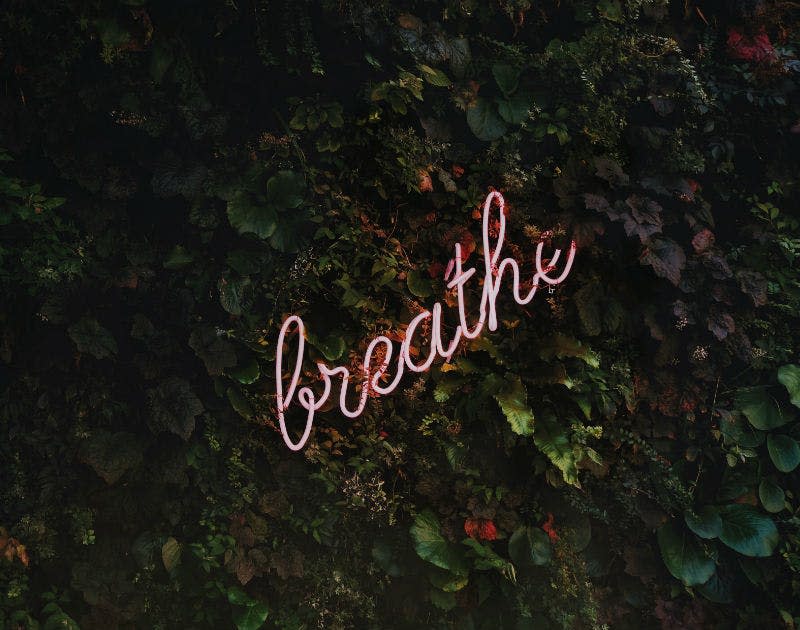Here’s How to Escape Social Media Stress in Just 4 Minutes a Day

Think about all the convenient, time-saving, and fun things you can do on your phone: shop for stuff, share and edit photos, order dinner, get instant answers to the strange questions that pop into your head at 3 AM, and umm… phone people. But all that access at our fingertips isn’t all good all the time. On average, we spend 20 percent (!!!) of our day on our phones. It’s a lot, but considering all the stuff our phones allow us to get done, it’s not that terrible. What is a bit scary though, is the possibility of 24/7 exposure to social media trolls. Our reliance on our phones might make the kinds of negativity and/or harassment experienced on these platforms a) unavoidable, and b) really invasive. How do you get a break from social media stress when you’re taking it with you everywhere you go?
Companies like Twitter and Facebook say they’re doing everything they can to combat harassment from the trolls that lurk their platforms but progress is slow, while posting a hateful tweet takes seconds. And it only gets worse when you take into account how disturbing the 24-hour news cycle has been this year.
“Many of us are tech addicts,” says Toronto Occupational Therapist, Yoga Studio director, and meditation teacher Ruby Knafo. “When we take a break from our devices we begin to notice the impulse to reach for the phone or computer and consume media out of habit, or as a means to distract ourselves from whatever else is going on in the moment. This is mindlessness in action—the opposite of mindfulness. Our habitual over-consumption of online news and social media is doubly harmful when the subject matter is upsetting. Our brains are hardwired to focus on what is negative and too much bad news can lead to an increase in stress, feelings of anxiety and depression, and a bleak worldview.”
So how do you cope mental-health-wise when there seem to be no more mental safe spaces? “It can be helpful to take some intentional time away from social media or technology,” says Knafo, “For example, have a designated time every day where you put your phone in a drawer for an hour—like when you get home from work or before bed. Becoming aware of that impulse or habit is really informative, and is a first step to curbing overconsumption.”

Developing a meditation practice is another way to protect your sanity when you find yourself in that ‘I just can’t even’ state of mind. It’s not nearly as difficult or time-consuming as you might think and the benefits are for real. “It’s a common misconception that you need to be able to meditate for at least 10 or 20 minutes to see any benefit,” Knafo told us. “In fact, just a few minutes a day is a great place to start and can have a significant positive impact on your life.
“I generally recommend that you set the bar very low for the first two weeks so that it feels attainable. For example, setting a timer for four minutes. It’s also helpful to pair meditation with another activity, like ‘After I brush my teeth in the morning, I will sit and meditate for four minutes.’ The most important factor is consistency. It’s better to practice for four minutes a day for one week, then to go to a one-hour class every weekend. Over time, four minutes will seem easy and you can begin to add on: six minutes, or 10, or 15. You may suddenly begin to see other opportunities to practice as well, like when you’re on the subway, or waiting in line at a store.”
Okay, that sounds easy enough to work into most schedules but, um, how exactly does one meditate? Does it involve sitting in a circle of lit candles at a secluded mountain ashram with your legs twisted into pretzels and chanting… or no? Because that is not a thing most of us would or could do on public transportation.
Luckily, there are different styles of meditation, many of which can be done anywhere, at almost any time, and completely inside your own head. Says Knafo: “Lovingkindness meditation is a common meditative practice that helps soothe the heart in stressful times. It’s a practice of cultivating goodwill towards ourselves and others, and can change our inner relationship with those we perceive as challenging or difficult.
“In this practice we silently repeat phrases of kindness and goodwill such as ‘May I be happy, May I be healthy, May I be safe, May I be at ease.’ To begin you might offer these phrases to yourself, and then move on to others (in the traditional order: a benefactor or teacher, a good friend, a stranger, a person who challenges us, and then all beings). It’s important not to practice this with any expectation of result, but to think of it as an experiment in cultivating compassion.”

Someone seriously smart and Greek (it was Socrates) once said, “Be kind, for everyone you meet is fighting a hard battle.” It takes compassion to view the world that way, but building up your ability to empathize can actually decrease your mental stress. Think of it this way: an internet troll’s power to hurt your basically disappears when you have empathy for that person and start to think about why they act so cruelly online—what’s happened (or is happening) in their life to make them lash out?
That said, it’s not always possible to empathize with everyone all the time. The next best thing is to use meditation to increase mindfulness, a practice that helps to quiet the stressful stuff coming at us via Twitter or Facebook and prioritize the real, concrete areas in our lives where we can make a change for the better.
“Meditation helps us to become more aware of what is going on when we feel overwhelmed—the various thoughts, emotions, judgments, and physical sensations that arise,” Knafo says. “When we’re not aware, stress can feel like a crushing weight, but with mindfulness we can begin to see the different components of what’s creating this felt sense we call ‘stress’, and then we get a clearer idea of what is needed in that moment. In short, mindfulness helps us to see and accept what we cannot change, and to identify more clearly the areas that we DO have control over so that we can take action.”
Is ‘Start meditating already’ on your list of New Year’s resolutions? Tell us about it on Twitter.
(Images via Tim Goedhart/Unsplash, Rawpixel.com, Mark Adriane/Unsplash)


